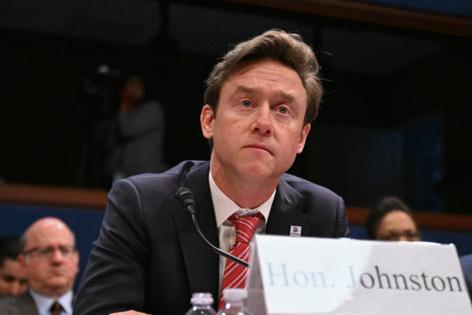Commentary: Denver's sanctuary policies leave Colorado vulnerable and cost taxpayers millions
Published in Op Eds
Denver has long been at the forefront of sanctuary policies, officially becoming a “sanctuary city” around 2013 and pioneering a trend that has transformed Colorado into a full-blown “sanctuary state”—and Coloradans are paying the price.
Legislation enacted by Democrat-dominated state lawmakers prohibits sheriffs from cooperating with federal Immigration and Customs Enforcement in identifying and deporting criminal migrants. This policy shields convicted criminals from deportation, releasing them back into Colorado communities instead of adhering to federal immigration laws.
This blanket approach to sanctuary policies not only weakens public safety but imposes significant hidden costs on Coloradans. Denver's leadership, particularly under current Mayor Michael Johnston, has championed and defended these policies, leaving taxpayers to pick up the tab.
Johnston and other pro-sanctuary officials don’t make it easy to figure out the number of criminal migrants who are convicted of serious crimes and then serve jail terms in dozens of Colorado counties and prison terms in the state's Department of Corrections. Fortunately, though, there does exist adequate real-world data we can check. That data is contained in the records of a federal government cost-reimbursement program for local jails and state prison facilities, which the U.S. Department of Justice administers under the "State Criminal Alien Assistance Program," or SCAAP.
SCAAP reimburses states and counties for the costs of incarcerating criminal migrants—funds that could ease Colorado’s financial burden but remain largely untapped due to political posturing.
In 2005, Colorado received $5 million in SCAAP reimbursements, with Denver accounting for $950,665 of this total. Neighboring states such as Arizona ($14.3 million) and California ($121 million) outpaced Colorado with significantly larger reimbursements, likely due to more effective reporting of incarcerated criminal migrants.
However, Denver is missing from the most recent 2024 SCAAP reimbursement total. The city did not apply for reimbursement. In fact, there is no record of a Denver SCAAP reimbursement in any year since 2016.
Why has Denver stopped seeking these funds? Could it be to obscure the number of criminal migrants in its jail system? In some cases, officers reportedly use "XX" instead of the correct two-letter code for a person's place of birth — a deliberate manipulation of data.
This lack of transparency raises critical questions about Denver's motivations and the impact on its citizens.
Does Denver no longer have criminal migrants in its jails? Why doesn’t Denver want to have federal reimbursement for those costs? If the number of criminal migrants in Denver's jails had not increased but merely remained the same each year from 2015 through 2024, the city's municipal budget would have been enriched by federal dollars in the approximate amount of 10 times $960,655 — or over $ 9.6 million.
So, why doesn’t the mayor of Denver seek federal reimbursement dollars for the costs imposed by the substantial number of criminal migrants annually? Is it because Denver’s progressives do not want to publicly acknowledge the significant number of criminal migrants who have been convicted of crimes and sentenced to jail terms in Denver?
The losses don’t end with SCAAP dollars. Recently, the Trump administration implemented a policy disqualifying sanctuary cities and states from SCAAP reimbursements altogether. This means Colorado's Department of Corrections, which received $1.3 million in 2024, and 20 counties that regularly accessed SCAAP funds for decades are now cut off due to sanctuary policies enforced at the state level.
The ongoing refusal to apply for SCAAP funding, combined with the steadfast enforcement of sanctuary policies, suggests that Denver’s leadership is prioritizing ideology over fiscal responsibility and public safety.
With Colorado’s state budget already facing a $1 billion deficit for FY 2026, failing to apply for federal dollars exacerbates an already dire fiscal situation. It’s not just a fiscal issue, though; public safety is at stake as criminal migrants are shielded from deportation and reintroduced into communities.
____
John Fabbricatore, a retired ICE Field Office Director, is a Visiting Fellow with the Heritage Foundation’s Border Security and Immigration Center.
_____
©2025 Tribune Content Agency, LLC.




























































Comments